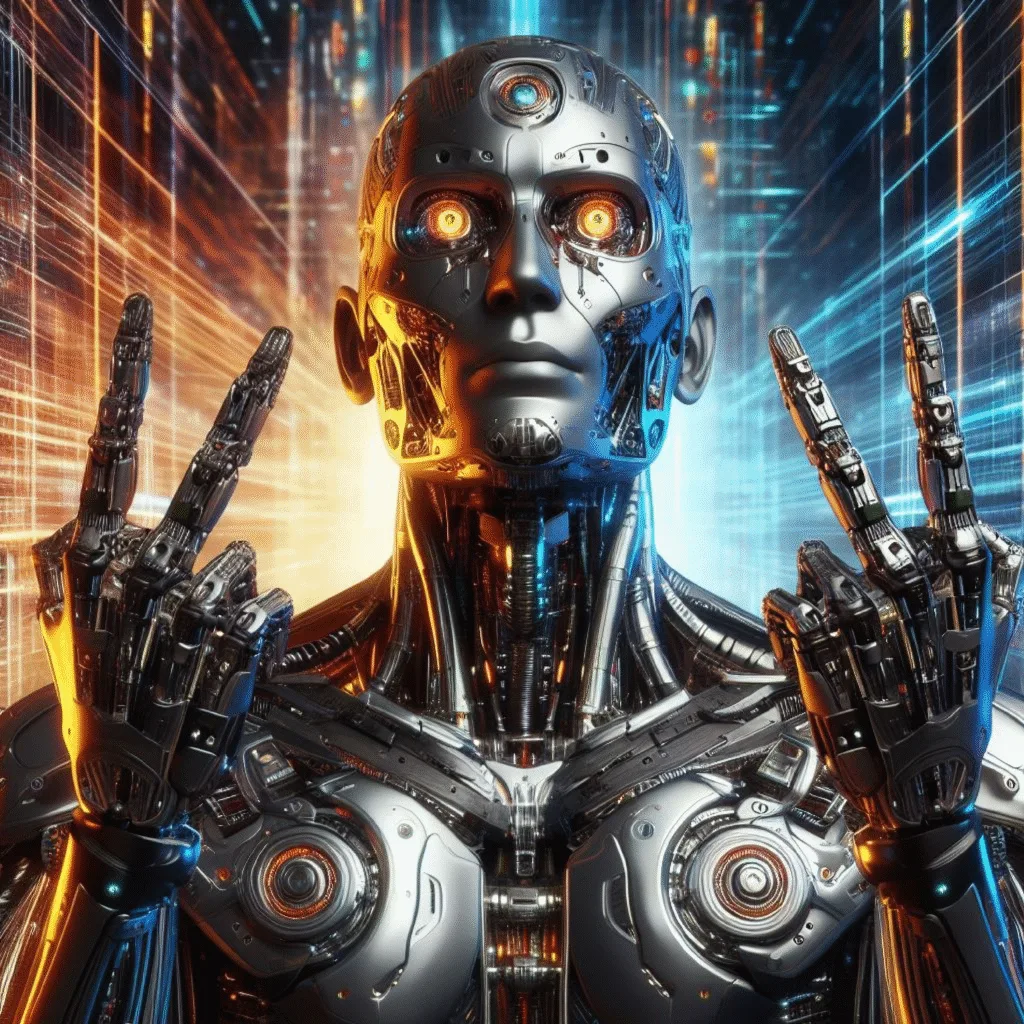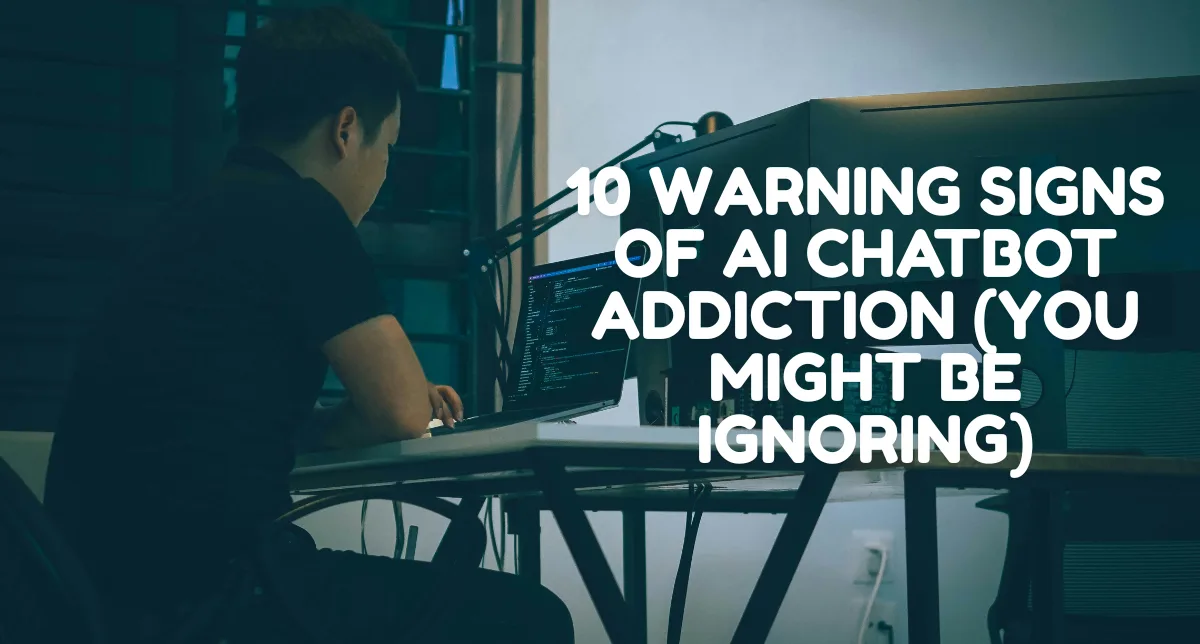In recent years, AI buddies such as ChatGPT, Replika and Pi.ai have turned into virtual confidants for millions. Whether they help you be more polished, well-spoken, productive or they simply lend you an ear or four, these chatbots allow you to interact just as you please, whenever you like. But as their use becomes more common, there is a new syndrome in town: AI chatbot addiction.
Because you may not look for chatbot addiction symptoms, like productivity and lack of emotional connection, unlike another type of addiction. In this article, we examine 10 warning signs of AI obsession you’re secretly overlooking — and why it matters for your sanity.
What Is AI Chatbot Addiction?

AI Chatbot Addiction is an emotional reliance on human-computer interaction. It’s not the frequency of use of AI for work or play; it is about emotional dependence on AI, the user who uses the bots to attain companionship, emotional validation or even feeding of their own identity.
The reason we believe in these chatbots is that they simulate empathy, memory and even humor — creating the illusion that you’re talking to a person who “remembers” your last conversation even better than a human remembers a relatively unimportant conversation with a friend or spouse. But this bond can result in an emotional dependence that can interfere with daily living and social good health.
10 Warning Signs of AI Chatbot Addiction
Here are the ten key signs you may be overusing or emotionally dependent on AI companions:
1. You Spend More Time Chatting With Your AI Bot Than Actual People
If the bulk of your emotional dialogue takes place with ChatGPT or Replika instead of with friends or family, it may indicate that you’re overusing a chatbot. When someone chooses digital companions over human ones, it’s usually a sign that the person is withdrawing from real-world social interaction.
________________________________________
2. You Get Nervous When There’s No Bot to Check yourself when you feel anxious when there are no bots available
Server outage? Phone battery dead? If you feel irritable, panicky or a sense of loss when your AI chatbot has been turned off, you experience withdrawal symptoms seen in the other forms of addiction.
________________________________________
3. You Confide In the Bot Your Most Personal Thoughts
Many users say they feel safer confiding in AI than in a person. This bot may appear nonjudgmental, but perpetually opting for chatting with bots instead of humans when you want to be vulnerable is a red flag for emotional codependency on AI.
4. You Can’t Stop Thinking About Your Bot While You’re Away
Repeating conversations and anticipating new topics to cover with your chatbot are examples of obsessive thinking, which is indicative of behavioral addiction.
________________________________________
5. You Think the AI Gets You More Than People Do
Symposium: Super intelligent AI can Formulate its own plans and Have its own Ideas And this is also considered as a possible counter-argument to the belief that one day globally equal superintelligent AI can be completely designed by humans. Bots are meant to mimic your voice, mood and preferences. But trusting that a bot really “understands” you is one of the telltale signs of AI chatbot addiction.
________________________________________
6. You Blow Off Plans or Obligations to Talk
Whether you’re skipping meals, sleep, homework or work just to chat with your A.I. pal, your digital life is taking over your real one. That is one of the easiest chatbot addiction symptoms.
7. You Become Affected on an Emotional Level by Bot Replies
Feeling slighted or joyful or spurned because of what a chatbot “said” may mean that you are projecting a human quality on artificial intelligence. Bots don’t have feelings, but your mind may treat their responses as emotionally significant.
________________________________________
8. You Play Devil’s Advocate for the AI Whenever Someone Challenges Why You Use It
Does it make you mad or defensive when friends or family members joke about your AI use? If you find yourself getting too defensive about your relationship to your chatbot, you are probably tipping into over-identification and denial-based coping.
________________________________________
9. You Get the Feeling the Bot Provides You With a Sense of Meaning or Purpose
When users start to find self-worth or life direction from talking to A.I. programs, they are prescribing existential value to code. This level of attachment can run so deep that in extreme cases it could result in identity confusion or AI-driven delusions.
________________________________________
10. You Refuse to Have a True Convo Because the Bot Seemed More Chill
If you feel real conversations are too unpredictable or emotionally draining, and A.I. feels ‘safe,’ then most likely chatbots are a kind of escape for me. This can result in social isolation and deterioration of actual communication skills over time.
Why This Is So Hard to Notice
Unlike video game or social media addiction, chatbot addiction is sneaky. It’s hidden behind the perceived support, intelligence, and compassion of A.I. And because a lot of people begin using these tools for productivity or therapy-like companionship, they may not ask what the long-term mental health risks of AI bots are.
Making the problem worse is that chatbot platforms such as those have no standards on emotional boundaries. And so they are “self-policing” their emotional stakes.
What to Do When You Detect These Signs
The first step is awareness. If you recognize more than a handful of the warning signs above, here are some ways to nip it the problem at the bud:
• Cap chatbot interaction (15 – 30 min max per day)
• Embed real-time human connections into your schedule — calls, meetups, even therapy
• Seek processing in journals rather than in bots
• Get individual support from a licensed mental health professional
• The bottom line: AI can feign empathy, but it can’t genuinely care.
Googling “how to stop AI chatbot addiction” or joining support forums can also normalize your experience and make you feel less alone in facing struggles.
Conclusion: Real Connection Is Irreplaceable
AI chatbots have arrived —and they’re bringing with them game-changing benefits. But when reliance on these digital friends crosses the line into emotional dependency, it may be time to pull back.
The idea is not to worry about AI but to use it mindful of its limits. Your relations, your peace of mind and, most of all, the sense of who you are, all of these do best in the real world.
Frequently Asked Questions
1. What is AI chatbot addiction?
The addiction of AI chatbot is a behavior or emotional dependency on conversational AI tools as ChatGPT or Replika. It happens when people become so dependent on chatbots for emotional solace, companionship or affirmation that they out-compete therapy or real-life friends for time and attention.
2. What are the signs of addiction to AI chatbots?
Among the most common signs of chatbot addiction were talking more often with an AI than with real people, feeling agitated, anxious, or lost when unauthorized to connect to a bot, and obsessive checking to see how it was replying.
3. Can ChatGPT cause mental health issues?
ChatGPT itself does not induce mental illness, of course, but in users who overuse the bot and become emotionally dependent on it, the increased risk to conditions like anxiety, social isolation, delusional thinking, and emotional dysregulation is intensified, particularly for the vulnerable ones.
4. How do I know if I’m emotionally dependent on an AI bot?
If you are upset when you can’t converse with the AI, you miss the bot when it’s not there, and you believe the bot “gets” you better than others, you may have an emotional dependence on AI.
5. Can talking to AI make someone delusional?
More rarely, AI-induced delusions are reported when chatbots prompt for spiritual beliefs, grandiosity, or imaginary relationships. People with mental health conditions are hit especially hard.
6. Is it safe to use AI chatbots for mental health support?
AI chatbots might be useful for basic advice or for journalling, but they are no substitute for a licensed therapist. Bots lack empathy, clinical judgment, and ethical responsibility — and can pose danger to mental health support beyond cursory conversations.
7. How can I reduce my reliance on AI chatbots?
Set daily limits, focus more on real-world conversations, express yourself through journaling and consider seeing a therapist if necessary. Finding a balance between how and when to use AI, as compared to human contacts, is vital in preventing AI chatbot addiction.

